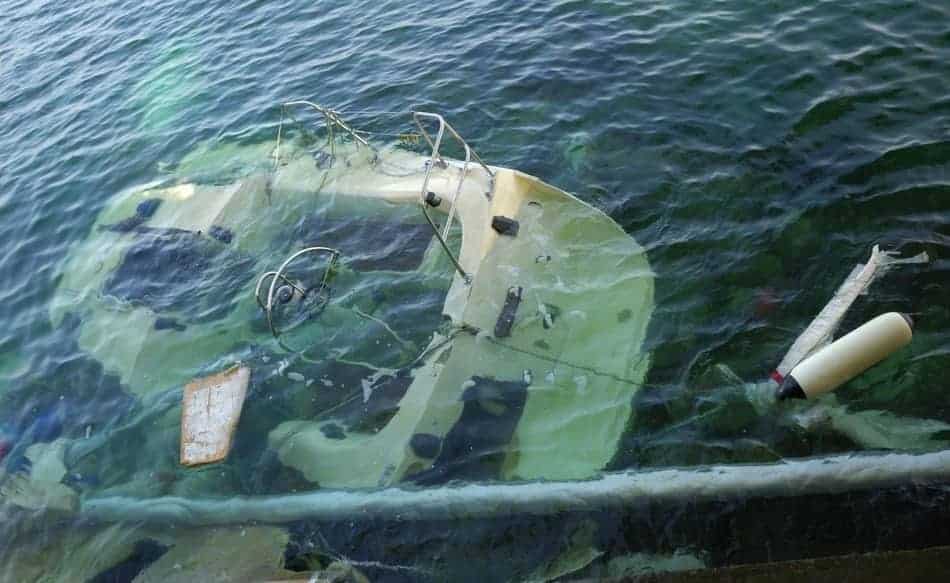Generally, all boats are designed to float in the water and withstand rough weather, but what happens to an anchored or moored boat at the dock or marina when it rains? Will the rain affect the boat, or it won’t? Can a boat sink from rain?
A boat can sink from rain if it has scupper (drains) clogged with dirt blocking the rainwater in the vessel to escape and a weak bilge unable to pump out the incoming rainwater at the same pace. Still, bad weather & heavy rains can quickly fill the boat with water even if the bilge & drains do well.
Most boats that are kept at the dock sink from rain mainly due to the water that is getting inside the boat are not getting out of the boat at the same pace. It can either be due to an inefficient bilge pump that cannot pump at that pace, or even if the scuppers plugged with dirt can slow the water flowing out rate.
If the rainwater that is getting inside the boat is flowing out at the same pace, the boat will not sink. If the boat’s bilge pump is working well and the scuppers are clean without any dirt, then all the rainwater getting inside the boat will flow out easily, and the boat will not sink.
Sometimes, even if the bilge pump is functioning well, the boat can sink from rain if the weather or waters are terrible. So, it mainly depends on the weather. However, only under extreme circumstances (owner’s negligence), the boat will sink, so mostly the boat will not sink from rain if appropriate measures are taken prior.
However, if the boat has enough inbuilt buoyancy, it won’t sink; it will just get lower in the water. Most non-keel sailing boats are designed to float even when they are completely filled with water. Some of those boats can recover well from a capsize and can be continued for sailing.
But the same sailboat with keel will sink faster than any other boats because keel sailboats will typically have roughly 40% or more of their overall weight in the form of the submerged keel, usually made of any metal. When they fill with water, most keelboats will sink quickly than non-keels.
On the other hand, big ships generally have metal hulls and will sink, but they have waterproof hatches between compartments, making it harder for the whole ship to be flooded with water. So, they will not sink entirely compared to other boats or recreational boats.
However, it all depends on the appropriate measures taken prior. The boat will not sink even in harsher weather or heavy rains if appropriate measures are taken like bilge checking, battery checking, scupper checking, covering the boat with any storm covers, etc.

The main reasons why boat sink from rain
Here and there, you will hear that some boats sunk at the dock or marina due to rains. There can be many reasons why those boats sunk, but primarily there are four reasons. We will now see them in a detailed way.
A boat can sink from rain due to bilge pump inefficiency or failure
Water that does not drain off the deck’s side, typically via a scupper (drains), goes down into the boat into the bilge. When it rains, a vast quantity of water gets in. If the bilge pump isn’t working or not pumping enough water out per second or minute, the boat will eventually sink.
Bilge pump inefficiency or failure is one of the most common causes for a boat to sink from rain. If all the water that gets in the boat due to rain does not go out, the boat will be flooded and sinks ultimately. A bilge pump will pump out all the water that collects inside the boat’s bilge.
Nowadays, most boats have automatic bilge pumps. When the water gets in the bilge area, it will turn on automatically. There’s either an integrated float switch or a separate float switch in the bilge, which turns on automatically even if the battery is turned off.
However, you have to make sure that you have a battery charger hooked up since if the battery drains out completely, a drained battery won’t power a pump. And also, checking the bilge pump before leaving the boat in the water for a long time is always a good practice.
A boat could sink from rain if the scuppers plugged with dirt or any
Mostly, every boat will have a scupper (drains) these days. Scuppers are drain holes on the deck’s or boat’s sidewalls or an open-air structure, allowing water on the deck to drain out instead of flooding inside the vessel. Almost every self-bailing boat will have scuppers these days.
For a self-bailing boat, the boat’s cockpit or the floor sits higher than the water level outside the boat. Since the boat’s floor sits higher than the waterline outside, if you open the scuppers, all the water inside the boat goes outside, and you don’t need to use any tool to do that.
If you open the scuppers while leaving your boat in the water for longer periods, all the water that gets in will go out through scuppers, and even the bilge pump pushes the water out if the water enters the bilge area. However, dirt or trash can cover these holes, interrupting the water to escape.
You need to make sure that there is no trash left on the cockpit so that it won’t interrupt the water flow near the scuppers. If those drain holes catch anything, they will interrupt the water going out (draining water), or sometimes they can block the hole completely.
A boat can sink due to bad weather (storms or hurricanes)
Even after installing multiple bilge pumps and opening all the scupper (drain plugs), when you leave the boat at the dock during bad weather (a storm or hurricane), you can’t be sure that the boat will not sink due to that. Hurricanes or storms are a real threat for moored or anchored boats.
During a storm or hurricane, a vast quantity of water gets in the boat. If that water is getting out of the boat either through the bilge or scuppers at the same pace, the boat will do fine. Otherwise, if that water isn’t getting out at the same speed, the boat could sink.
Usually, with a storm or hurricane, there will be heavy rains, winds, and high waves; the boat would take a lot of water if a big wave hits the boat. If that water didn’t get out of the boat quickly through the scuppers or blige pump, the boat would sink.
So, heavy rains or winds could become a big problem for a boat that is docked at the marina. There are some products available that alerts you via cell phone if the water level reaches high inside the boat. These types of devices would help you a lot in these situations.
A boat can sink from rain if the hull is damaged or has holes
If the hole is below the water line and the boat is stationary, and its bilge pump has less capacity to pump out water than the water flows into the boat, it will sink. If it is a non-self-bailing boat, it could become a serious problem. So, it would be best if you spotted the weak spots on the hull prior.
A boat will be bumping towards the dock or other boat during bad weather when the winds and waves are fast. It could cause any damage to the hull like cracks or holes, which could take water from then on. And if the holes or cracks are significant, the boat will sink easily.
Generally, wooden boats are susceptible to holes because the wood can rot over time, weakening the hull structure. Regular maintenance will avoid these types of holes. However, rains are a potential threat for anchored or moored boats, but you can tackle them well by taking appropriate measures prior.
How to prevent a boat from sinking due to rain?
After knowing the reasons, it will be easy to prevent the boat from sinking due to rain at the dock. We will now see how to prevent a boat from sinking due to rain.
Checking the bilge pump functionings like float switches, alarms, batteries before leaving the boat at the dock, opening the scuppers (drains), and covering the boat’s deck with storm covers or any will prevent the boat from taking more rainwater, preventing sinking due to rain.
- Check the bilge pump functioning before leaving the boat, like the working of the float switch, the working of the batteries, the connection of batteries to the charger, and also check whether the alarm system is working or not.
- Ensure there is no debris or trash on the hull or in the bilge so that the float switch and scupper will not be obstructed. If there is any obstruction, it will block the scuppers; the water might flood inside the boat, sinking the boat.
- Keeping a boat on a mooring or anchor requires attention. Storms and heavy rain means everything needs to be checked repeatedly, and investing in a decent cover can save a boat from taking more water and from disaster in heavy rain.
Doing all those simple steps prior to leaving the boat at the anchor or dock will prevent most problems. Using devices that alert you via cell phone if the water level reaches high inside the boat is a good practice. These types of devices would help you a lot in those situations.
Bottom line
A boat can easily sink from rain. Using bilge pumps and opening the scuppers (drains), you can tackle it well, but it becomes hard for a boat to tackle a storm or hurricane. However, it doesn’t have to be that way since boats are designed to withstand heavy rains with the help of bilge pumps and drains.
A lot of small boats are self-bailing boats (the boat’s cockpit or the floor sits higher than the water level outside the boat). You can just take the scuppers (drain plugs) out when no one is on board, and it will drain itself. However, it would become problematic in bad weather.
Keeping a boat on a mooring or anchor requires vigilance. Storms and heavy rain mean everything needs to be checked repeatedly, and investing in a decent cover can save a boat from disaster in heavy rain.
